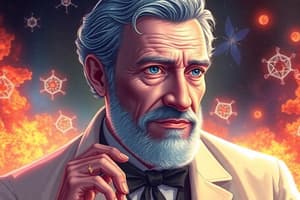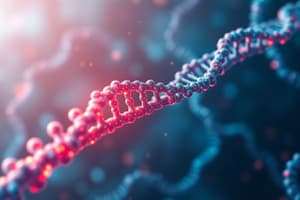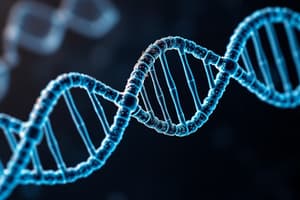Podcast
Questions and Answers
What was Frederick Sanger's primary area of scientific expertise?
What was Frederick Sanger's primary area of scientific expertise?
- Medical genetics
- Experimental biochemistry (correct)
- Theoretical physics
- Computational biology
Which scientific milestone occurred in 1977?
Which scientific milestone occurred in 1977?
- Received his first Nobel Prize
- Completed his doctoral research
- Published the dideoxy method of DNA sequencing (correct)
- Opened the Wellcome Sanger Institute
What was the subject of Sanger's doctoral research?
What was the subject of Sanger's doctoral research?
- Nitrogen uptake in potatoes
- The structure of DNA
- Amino acids and protein structure (correct)
- The chemical sequencing of insulin
What significant discovery did Sanger make about proteins?
What significant discovery did Sanger make about proteins?
What was the focus of Sanger's research during World War II?
What was the focus of Sanger's research during World War II?
In which year did Sanger receive his first Nobel Prize?
In which year did Sanger receive his first Nobel Prize?
With whom did Sanger share the 1980 Nobel Prize?
With whom did Sanger share the 1980 Nobel Prize?
What is the name of the genome research center Sanger opened in Cambridge?
What is the name of the genome research center Sanger opened in Cambridge?
What significant scientific advance did Sanger's dideoxy method enable?
What significant scientific advance did Sanger's dideoxy method enable?
What influenced Frederick Sanger's strong sense of truth and conscience?
What influenced Frederick Sanger's strong sense of truth and conscience?
Flashcards
Frederick Sanger
Frederick Sanger
A two-time Nobel Laureate known for sequencing DNA, RNA, and proteins.
Sanger Sequencing
Sanger Sequencing
A method for DNA sequencing developed by Frederick Sanger in 1977.
Nobel Prize in Chemistry 1958
Nobel Prize in Chemistry 1958
Award received by Sanger for his work on the sequencing of insulin.
Second Nobel Prize
Second Nobel Prize
Signup and view all the flashcards
Doctoral Research
Doctoral Research
Signup and view all the flashcards
Insulin Sequencing
Insulin Sequencing
Signup and view all the flashcards
Wellcome Sanger Institute
Wellcome Sanger Institute
Signup and view all the flashcards
Amino acid sequence
Amino acid sequence
Signup and view all the flashcards
Micromethods
Micromethods
Signup and view all the flashcards
Quaker beliefs influence
Quaker beliefs influence
Signup and view all the flashcards
Study Notes
Frederick Sanger: A Biographical Overview
- Born in 1918, Gloucestershire, UK, son of a doctor
- Influenced by Quaker beliefs emphasizing truth and conscience
- Studied at Cambridge University, developing interest in biochemistry
- Graduated in 1939 with an undergraduate degree
Sanger's Scientific Path
- Studied advanced biochemistry after parental deaths
- Pursued self-funded PhD (1940) on amino acid metabolism
- Exempted from military service during WWII
- Conducted applied research on nitrogen uptake in potatoes
- Received PhD in 1943
- Joined Cambridge research group focusing on protein sequencing
- Developed innovative techniques (micromethods)
- Determined insulin's amino acid sequence in 1955
Sanger's Nobel Prizes
- Awarded the 1958 Nobel Prize in Chemistry for sequencing insulin
- Shared the 1980 Nobel Prize in Chemistry, with Walter Gilbert and Paul Berg, for DNA sequencing
- Developed dideoxy method (later known as Sanger Sequencing) in 1977 for sequencing DNA
Sanger's Legacy
- Revolutionized molecular biology with DNA sequencing techniques
- Ushered in a new era of medicine, gene therapy, and genetic manipulation
- Established the Wellcome Sanger Institute in Cambridge, UK (1993), a genome research center.
Studying That Suits You
Use AI to generate personalized quizzes and flashcards to suit your learning preferences.




